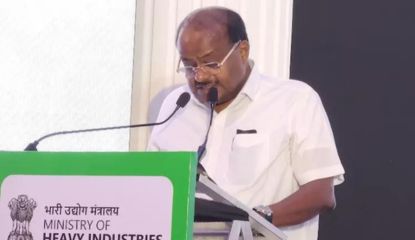The vehicle electrification trend has been on the upswing in India, with the country witnessing a growing adoption of EV across vehicle segments, including two-wheelers, three-wheelers, four-wheelers, and commercial vehicles, over the last few years.
While EV sales in India cumulatively hit 1.17 million units in FY23, and recorded a substantial 155 percent growth in response to growing demand, there has been a perceptible slowdown in the recent past. Passenger vehicle OEMs registered an 18 percent degrowth in EV sales earlier this year in May, and, as per industry experts, the trend is likely to continue in the foreseeable future.
However, with continued advancements in EV technology, rising awareness about the benefits of these zero-tailpipe emission vehicles, and a push from the government with its incentivise schemes, the EV industry in India is poised for greater heights in the future, as per the newly-appointed Union Minister for Heavy Industries, HD Kumaraswamy.
Speaking at an event in New Delhi on bridging the skill gap in the EV sector, Kumaraswamy asserted his optimism on the sector, and said, “The Indian automotive industry is at the cusp of a transformative era, in line with the country’s goal of reaching net-zero by 2070, and meeting the sustainable development goals 2030.”
“The global shift towards EVs is not just a trend; it is a revolution that promises to redefine our relationship with skilled and trained workforce. As one of the world’s largest automotive markets, India stands to gain significantly from embracing e-mobility. It is a journey that promises economic growth, environmental sustainability, as well as enhanced energy security.”
Kumaraswamy further said that the Indian automotive industry is one of the fastest growing sectors which not only drives economic growth, but also employs lakhs of people in the country. “With respect to e-mobility, the sector is poised for significant growth in the years to come, driven by the advancements and improvements in various EV technologies, increasing consumer awareness, and supportive EV policies.”
“It is pertinent to also mention that the government has been taking several initiatives to promote the faster adoption of EVs in the country. This includes the FAME-1 and FAME-2 schemes, as well as green urban transport and urban mobility schemes. The government is paving the way for sustainable and inclusive growth of the EV industry.”
“Subsequently, multiple state governments have been providing incentives to attract EV manufacturing in their respective states. Moreover, India achieved a significant milestone as EVs exceeded 1 million units in FY24 for the first time. Recently, to unlock the full potential of EV manufacturing in India, the Ministry of Heavy Industries also launched the Electric Mobility Promotion Scheme (EMPS) 2024 aimed at accelerating the adoption of e-mobility in India, with a total outlay of Rs 500 crore,” he pointed out.
The Union Minister said that in alignment with the Atmanirbhar Bharat initiative, the EMPS scheme is designed to encourage domestic manufacturing in the entire EV supply chain and create employment opportunities. “Localisation will need innovations as well as skill development, and will position India as a global leader in the electric mobility sector,” he reaffirmed.
Kumaraswamy touched upon the subject of skill enhancement, and said, “We are witnessing a rapid growth in technological advancements in multiple areas such as battery technology, power electronics, e-motor designs, among others. Therefore, to cope with this rapid growth and encourage innovations, the need of the hour is to develop skill assets to cater to the evolving industry needs. Our workforce must be prepared to handle the challenges and opportunities presented by EVs.
“The government has already initiated preparation of the Automotive Mission Plan 2024-2047, in association with SIAM and ACMA. The mission plan can spell out specific recommendations and details about how to make the workforce meet the requirements of the sector. The government is also collaborating with various institutes and bodies such as ASDC to develop electrification programmes, and focus on creating job roles, and standardising them.”
“Therefore, our workforce must be prepared to handle the unique challenges and opportunities in fulfilling India’s ambitious goals of electric mobility. I would like to encourage the industry in its collaborative efforts to develop a skilled workforce by investing in training and education. This will ensure that India is at the forefront of the global EV revolution,” he signed off.

